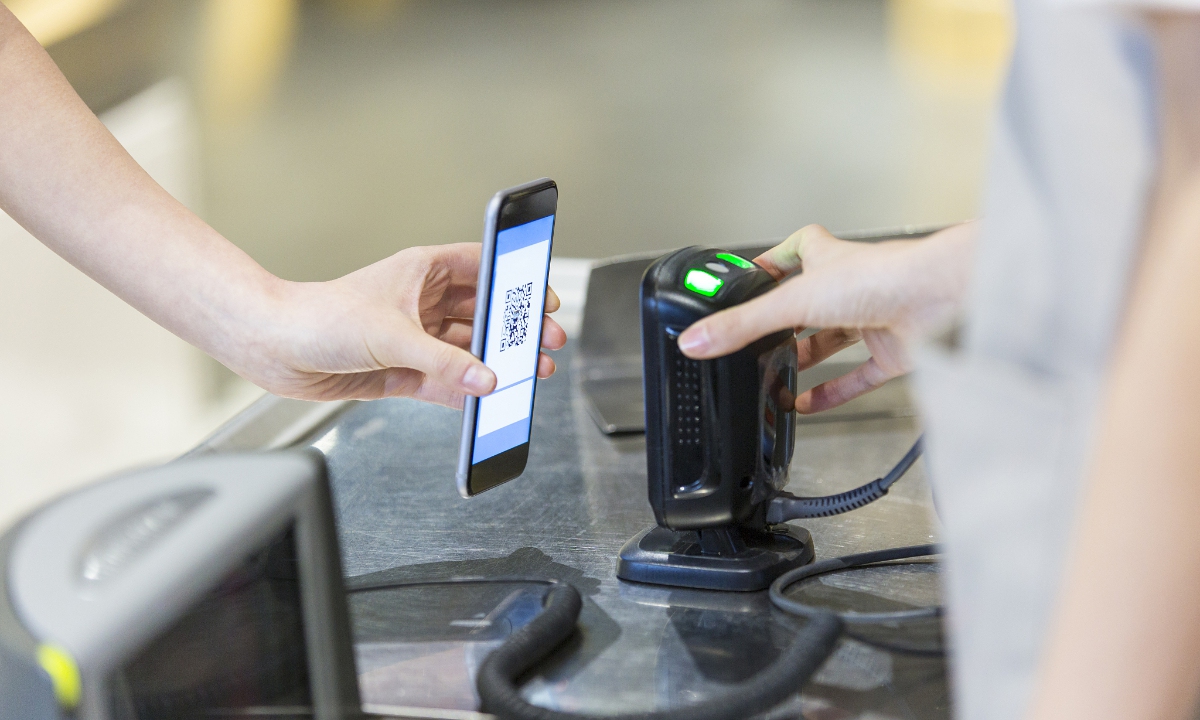Payment by foreigners using overseas wallet soars as optimized payment services deliver tangible convenience

Mobile payment Photo:VCG
Transaction volumes of foreigners using overseas wallet apps to pay for goods and services in China have grown more than sevenfold, the People's Daily reported on Thursday, citing data from Chinese online payment clearing house NetsUnion Clearing Corporation.
The data is a clear result of efforts by the Chinese government in recent months to implement measures to streamline payment processes for overseas travelers, highlighting the country's ongoing commitment to enhancing high-level openness, experts noted.
In the first six months, the number of transactions of foreign wallets making domestic payments reached 28.75 million, growing 5.29 times from that of the same period last year. Meanwhile, transaction volume reached 5.32 billion yuan ($732 million), 7.67 times last year's figures.
The large increase in payment figures has effectively facilitated foreigners traveling in China and promoted bilateral trade and economic exchanges, according to the report.
In addition to enabling foreign electronic wallets, the clearing house has jointly worked with commercial banks, payment platforms and bank card clearing institutions to roll out services that allow foreigners to tie their credit cards to domestic payment apps to make payments in China.
"The measures are necessary as China's opening-up has entered a new phase in the post-COVID era amid the government's efforts to boost people-to-people exchanges between China and the rest of the world," Dong Shaopeng, a senior research fellow at the Chongyang Institute for Financial Studies at the Renmin University of China, told the Global Times on Thursday.
As technically the matter is not complex, the inconvenience felt by foreigners caused by China's rapid advance in mobile and cashless payments will be effectively fixed with increasing demand from foreigners visiting China in ever-growing numbers and the level of attention given by authorities in China, Dong said.
With the introduction of 144-hour visa-free transit policy for foreign nationals from 54 countries, an increasing number of foreigners are taking the opportunity to visit China, starting a trend and creating buzzwords on social media.
In the first five months of this year, the number of inbound visits exceeded 12 million, with over 7 million visits by foreigners under the 144-hour visa-free transit policy, Chinese Foreign Ministry spokesperson Mao Ning told a routine press conference on Thursday.
During the recent Dragon Boat Festival, the number of entry/exits made by foreigners increased by 57 percent from the same period last year.
China will continue to optimize the experience for foreign visitors to make their travels in China more convenient and comfortable. China's always ready to welcome friends from around the world with open arms, Mao said.
China is working to bridge the differences in payment practices domestically and internationally to provide better overseas bank card services.
In March, China released a guideline aimed at continuing to optimize payment services of bank cards, promoting cash use and facilitating mobile payment as part of the efforts to better fulfill the diverse payment preferences of foreigners and senior citizens in the country.
The People's Bank of China, the country's central bank, also rolled out multilingual payment services guide for foreigners. For instance, the South Korean language version guide was released at Zhangjiajie in Central China's Hunan Province, which is a popular travel destination for South Korean tourists, to provide more targeted services.
In alignment with China's efforts to build a fully accessible, diverse and globally compatible payment ecosystem, international bank card clearing institutions, such as Visa and Mastercard, have recently reduced transaction fees on overseas bank cards for Chinese merchants, boosting the appeals of their service to local Chinese merchants, according to Xinhua.



